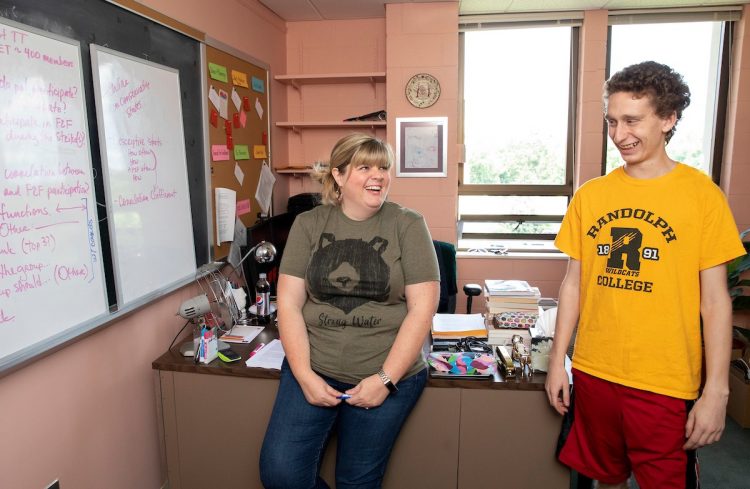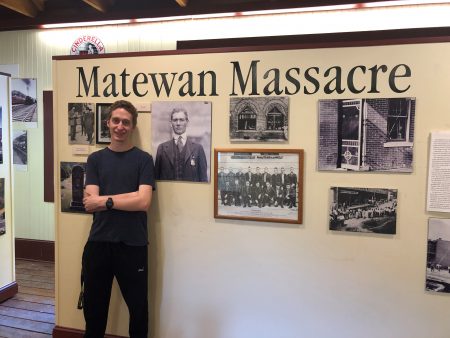Mining information: Summer Research considers role of social media in organizing West Virginia teacher strikes

Professor Crystal Howell and Caleb Schmitzer go over their notes about the project
When Caleb Schmitzer ’21 gets deeply engaged in conversation, he knows his Minnesotan accent sometimes slips out. But thanks to his Summer Research project with education professor Crystal Howell, he’s become very familiar with a different type of accent—the one shared by the many West Virginian educators he has talked with about teacher pay and benefits in the state.
He and Howell are analyzing the role of social media in organizing the 2018 and 2019 statewide teacher strikes in West Virginia. So far, the duo has conducted research on both the strikes and the Facebook group used to organize them. As more and more teachers go on strike around the nation, they are also hoping to use member feedback to develop a guide for other teacher organizations to use.
The group has 24,000 members, which represents about half the teachers in the state. In order to protect the privacy of its members, Schmitzer and Howell have given the group the pseudonym name of “Teachers Together.”
“Basically what we want to know is what makes that group work so well,” Howell said. “We’re looking at how they’ve been able to organize, for the first time ever, teachers in all 55 counties in a geographically large, spread out, and disconnected sort of state and how they continue to use it.”
In addition to analyzing the group and surveying its members, Schmitzer and Howell also visited West Virginia for themselves. They interviewed the group’s administrators and moderators, gathering their thoughts about why it is so successful in uniting teachers and organizing demonstrations across the state. Howell and Schmitzer surmised that one of the main factors is the communication style.
“They wanted people to feel more empowered, and one of the things I’ve observed is they follow more of a horizontal communication structure that gives members a way to start feeling empowered by putting their ideas out there and having a voice,” Schmitzer said. “By working on a more even level for everyone, they’ve got that power to put their ideas out there and whether it gets shut down or not, they know it’s being discussed.”
“What seems to make it work is that the members are respectful of one another and appreciative of each other’s expertise and experience in the classrooms,” Howell added. “They recognize that they’re all teachers and they spend all day being in charge of dozens of kids, and they know they’re capable of taking charge and talking with anyone, including state legislators and union leaders in Charleston. They realize that this is their union.”
Schmitzer and Howell have also noticed similarities between today’s teacher unions and the coal mining unions in the early 20th century. The teachers they’ve interviewed see it as well.
“Many of the teachers say they remember when their dad or papaw was in the union and they were on strike for two years,” Howell said. “They still have that sense of personal sacrifice for the greater good and knowing their worth in terms of labor. The teachers really see themselves as part of history.”
As part of their trip to West Virginia, Schmitzer and Howell visited both the developed, industrial areas in the central and northern part of the state, as well as some of the impoverished rural communities in the south. One of their stops was in the town of Matewan, which was a significant historical site during the mine wars at the turn of the last century. The southern part of the state is also the home to many of the first teachers who went on strike in recent years.

Caleb Schmitzer pictured at the museum in Matewan, W.Va., as part of the trip he and professor Crystal Howell took to West Virginia
“There really are two West Virginias,” Howell said. “There’s the clean, beautiful, well-kept parts of the state where there’s always cell service and the WIFI is great, and then there are the hollers and the hills, and the people who live there feel like they’ve been forgotten.”
For Howell, the issue of teacher pay and support, especially in West Virginia, is personal. She is a native West Virginian, her mother is a teacher, and she was a teacher herself in the state before earning her Ph.D. and coming to Randolph. She was also a member of the Facebook group.
“Teachers in West Virginia are barely getting by, especially if you’re married to another teacher or school employee,” Howell said. “It’s not enough to have a middle class life in a lot of communities.”
Howell met Schmitzer last fall when he took her Education 101 course. She asked Schmitzer to partner with her on the Summer Research project because she was impressed by his broad skill set in history and math. Even though he’s not an education major, Schmitzer agreed because of his intellectual curiosity—and for a summer job.
“I get to stay on campus and work with someone I know and trust to give me good advice,” Schmitzer said. “That’s really helpful from a student perspective because I get to learn and I know that my information is accurate and these are skills I can take with me not just to the next school year, but to any job that I go into. Being a history major is all about learning how to think logically and record information accurately, so what I’m doing is going to be really useful going forward.”
Schmitzer hopes to one day use his talents to help design historically accurate video games. However, he also has a personal appreciation for teachers.
“My mom was a teacher assistant in an elementary school and is currently a librarian that works for the county,” he said. “So what we’re researching may not be directly related to me, but my mom is a public worker and I want her to be treated fairly. It’s also interesting because I’m getting to work on current history. This is the kind of thing that will be recorded and looked at as history in 20 years, and it’s exciting for me getting to be ahead of the curve.”
Tags: Crystal Howell, education, history, summer research, summer research 2019, teacher strikes
